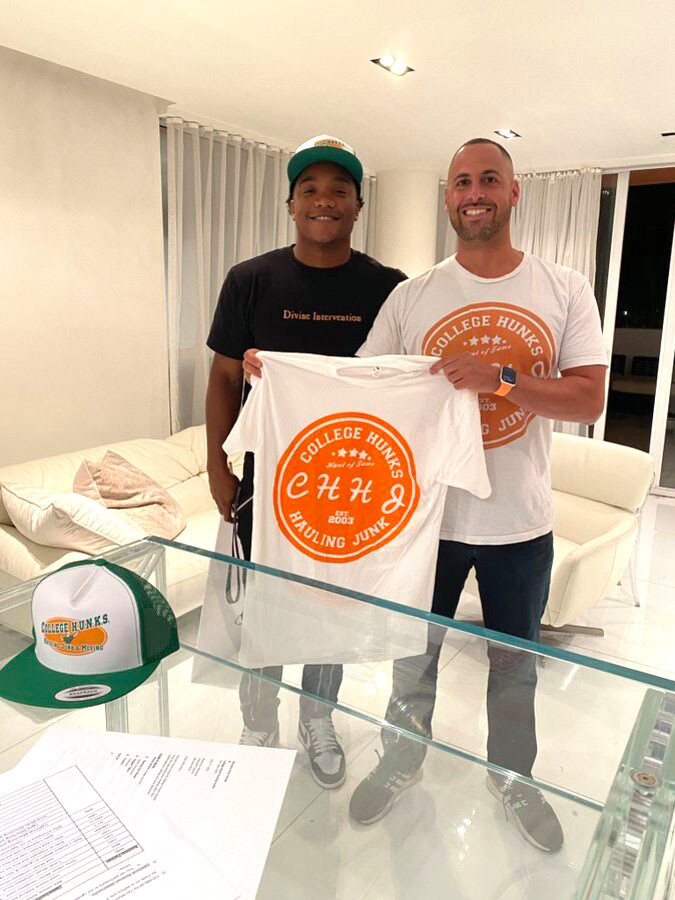More On: ncaa
These athletes already profiting from NCAA rule change
Exploiting shift is just the start of playing true winning baseball
Jalen Suggs’ Gonzaga stunner joins top 10 buzzer-beaters in sports history
March Madness referee Bert Smith collapses during USC-Gonzaga
Why Ian Eagle should call the Final Four over Jim Nantz
At midnight, the deals began. By the morning, more were completed and they continued into the evening.
At midnight, the deals began. By the morning, more were completed and they continued into the evening.
The first day of the Name, Imagine and Likeness era was an eventful one for college athletes, who were finally able to profit after the NCAA and its schools had made money off of them for decades.
“It was a little bit of a roller-coaster,” LSU offensive lineman Marcus Dumervil told The Post in a phone interview. “It’s been a long time coming. It’s been a wild day for athletes across the country.”
Dumervil was one of many players who were busy on Thursday. He agreed to deals with two companies: Jenloop, which offers fans the opportunity to get personalized videos over Instagram or Twitter from celebrities or athletes for a fee, and sunglasses company Tomahawk Shades.

Miami quarterback D’Eriq King was a big winner, agreeing to do business with several entities that paid him more than $20,000 on Thursday, he told Sports Illustrated. One of them, Dreamfield, is a public appearance business he co-founded with Florida State quarterback McKenzie Milton, and includes a number of other student-athletes.
Five members of the Deion Sanders-coached Jackson State football team agreed to terms with 3 Kings Grooming products. Auburn quarterback Bo Nix locked in an endorsement deal with Milo’s Sweet Tea. The Yoke app, which enables athletes to earn money by playing video games with fans, has hundreds of collegians. That group includes St. John’s transfer Vince Cole of Coastal Carolina and Ohio State forward Zed Key from Long Island. Jenloop added several college football players on Thursday alone.
“For us, we’ve never been busier,” said Ryan Detert, the CEO of Influential, an influencer marketing company. “We’ve got dozens of campaigns lined up.”
Perhaps the biggest surprise is that some of the biggest deals didn’t come from the highest-revenue sports. Twin sisters Hanna and Haley Cavinder of the Fresno State women’s basketball team became spokeswomen for Boost Mobile and have a billboard in Times Square. The twins have more than 3.3 million followers on their joint TikTok account. Nebraska volleyball player Lexi Sun is partnering with volleyball apparel company, REN Athletics, to design her own crew neck sweatshirt as part of her own athletic line with the company. Sun, who has more than 75,000 followers on Instagram, has heard from several companies about other opportunities. LSU gymnast Olivia Dunne, the most-followed college athlete on Instagram and TikTok, with more than five million followers, is expected to land a megadeal.
“You can tell a lot of people have put in a lot of work behind the scenes to grow their brand,” Sun said.
The debate over NIL in recent months and even years was based on the premise it would only benefit a select few people, that players in the big money college sports like football and men’s basketball would rake in a majority of the profit. Early on, that doesn’t appear to be accurate.
“Many of the state legislators who have supported NIL legislation expressed beliefs that the athletes in these sports would have a chance to capitalize on these unique business opportunities, especially for women’s sports,” said Gregg Clifton, a former sports agent who now works as a sports attorney. “Remember, not every NIL deal is going to involve superstar athletes for big dollars. The majority of opportunities will simply provide student athletes a chance to make money for the use of their name, image and likeness.”
This story originally appeared on: NyPost - Author:Zach Braziller






















